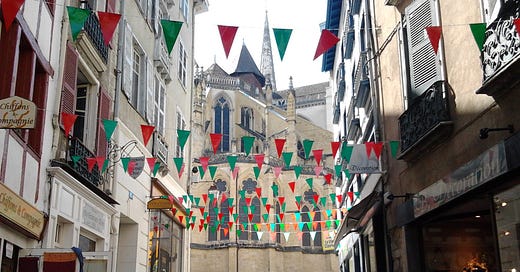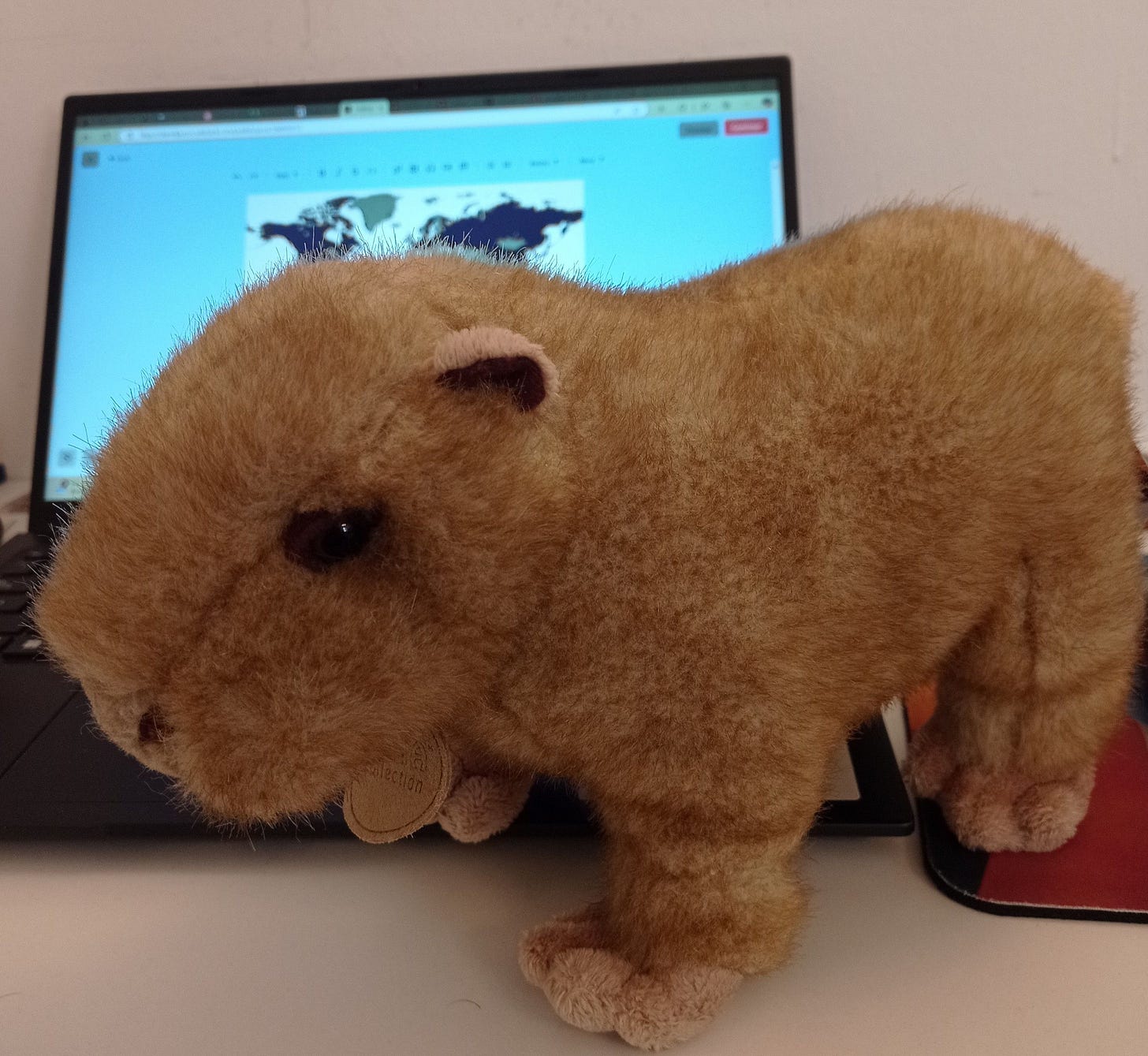This is Part 2 in my Identity and Belonging series, and Part 1 (of 2) about being an awful language learner.
Just to confuse you even more, let’s start with a couple of acronyms.
In April 2005, I embarked upon my TEFL career by doing a CELTA.
TEFL: Teaching English as a Foreign Language
CELTA: Certificate in English Language Teaching to Adults
It was meant to be a two-year gig before I found a ‘real job’ and started a ‘proper career’.
Two years turned into two-plus decades – oops.
Because I’m terribly nostalgic and reflective, I figured now would be a great time to reevaluate a few things in my life, starting with why I’m a terrible language learner.
And yes, I’m ashamed of myself.
Let’s see how well my reasons excuses hold up.
A Mini Biography of Squandered Youth
I lived in Spain from the ages of 10-13 and Germany from 13-16.
I barely learned Spanish or German. I blame the education system and maybe my parents (sorry, I mean this in a nice way). Could/Should either of them have done more?
I went to an American curriculum school on US military bases where, strangely in retrospect, language courses weren’t even mandatory (feel free to come to your own conclusions about foreign policy priorities). In Spain I instead took a ‘Host Nation’ class which included some basic Spanish lessons but was mainly about Spanish culture. I loved it – this is where I learnt to appreciate Goya and Velázquez and we took 3 field trips to the Museo del Prado.
As for German, there was 1 optional language class for a semester, which I struggled through and then said, ‘to hell with it.’
Two of the biggest factors in learning a language are need and motivation. I had neither.
Then I returned to England (for the 3rd time) for my final 2 years of school, where I studied…Spanish.
And I did well, despite not having a need, so that means I must’ve had some motivation, though who the hell knows why living in the UK. I got some of the highest marks in class, even outperforming native Spanish speakers, who were incredulous that I knew grammar and vocabulary better than they did (at least according to our tests).
The problem? Bizarrely, our marks had no speaking component. It was pretty much all memorisation.
These other kids grew up speaking Spanish but had never studied the grammar rules.
Which is kind of why so many native speakers of English (a term I dislike, by the way) struggle to teach English. Many of us don’t know the grammar rules, something I had major issues teaching my first couple of years.
University – damn my motivation!
I studied at Tufts, a university renowned for its international relations programme (you can find Tufts professor
sharing his expertise right here on Substack, in fact).I changed my degree from IR to history though.
Why?
I couldn’t face up to the 4 years of language study requirement. I didn’t even know which language to choose. French? Russian?
But all humanities students still had to take 2 semesters’ worth of a foreign language and so I chose the easiest option, which was…Spanish.
This time, after my first semester, I was a disaster. I could barely speak it and my teacher laughed at my attempts, in a nice way - I’m not sure if I should tell the stories of how I flirted outrageously and visited her office hours every week for additional ‘guidance’ and ‘practice’.
The TL;DR version: Even though my degree (or major) was history, I asked my profesora to be my academic advisor.
“But Dani-yel,” she said. “I am not a history professor!” I even took another, third semester of Spanish (motivation!) and when we had a class outing at the end of the term at a Spanish tapas restaurant, I had way too much sangria and then [editor’s note: end of story, this gets a bit saucy from this point on]
Things were slightly awkward between us after that.
France, 2004 – I was making good progress, until…
After my master’s in IR at Edinburgh, my girlfriend and I were looking at international development jobs in West Africa. Since many of the opportunities were in Francophone countries – the African Development Bank, for example, is based in Côte d'Ivoire – I started studying French on my own, doggedly putting in a few hours a day.
Need? Check.
Motivation? Also check.
French appealed to me – I wanted to read many classic works of literature in the original. I was also going through an existentialist phase, and I had my Sartre and Camus ready to tackle. So I genuinely wanted to learn and made admirable progress in a short time, all self-taught.
But would I be able to speak it?
Eager to test out my progress in the field, despite having very little money, I decamped to the south of France for a few weeks, starting in Montpelier. Inspired by George Orwell’s experiences in Down and Out in Paris and London, I tried to find work in a French kitchen as a dishwasher.
I had a strict budget of around 15 euros a day, which covered:
a cheap hostel
a Le Monde newspaper, which I spent ages devouring (how pretentious of me!)
two cappuccinos
a baguette, cheese, olives and charcuterie from the supermarket
a plastic 1.5 bottle of plonk – this might last me anywhere from a day to three.
(I’ve always maintained that as great as French and Italian cuisine are, these are fantastic places for budget travellers. You can get so much high-quality cheap fare at the supermarket and local wine is incredible value.)
After mornings reading the newspaper, books and poetry in cafés, as if Les Fleurs du mal were going to help me, I’d wander the town trying to pluck up the courage to speak to people. It was late April and the weather was splendid but I seemed to spend most of my time loitering on park benches with my reading materials. I’d then lunch on my supermarket fare in the park, with more of the same food in the evening, but accompanied naturally, by my red wine.
I had no luck finding work in Montpelier, but I did get great language practice at my hostel. I found the perfect speaking partners: three guys, from Niger, Morocco, and Algeria, who were always stoned out of their minds. They spoke slowly, used basic vocabulary, were super chilled and incredibly patient with my pathetic attempts at French. To this day, I half-jokingly advise students struggling with speaking practice and listening comprehension to find some stoned people to talk to.
(Though, as a caveat, don’t take this too far: to save money, I got around by hitching and was given a lift on this trip by a woman driving an old Volkswagen Beetle. She was completely baked and if she had driven any slower, we’d have been going backwards. Once I overcame my fears, I relaxed, enjoyed the lovely chansons playing on the radio, and had a pleasant conversation.)
One of few non-hostel attempts to make conversation ended in total failure. I had just enough in my daily budget one day to afford a beer at a bar and I tried my best chit-chat on Pilar, the enchanting barmaid. She was remarkably patient and forgiving but I could tell from the look of consternation on her face that it wasn’t going well. I blame it on my lousy pronunciation and limited vocabulary – and for thinking Baudelaire was going to help me master the language. I didn’t quite know the French for “Madam, your eyes are more dangerous than any duel I have fought – one glance, and I am struck through the heart. Shall I surrender now, or must I endure the slow agony of your continued beauty?”
With funds running low, I moved onto Carcassonne, where there was a promising opportunity to earn some money with free accommodation just outside the town, amidst the vineyards and meandering hills of Preixan. In return for room and modest board at a hostel run by an English woman, I did 3 hours of strenuous gardening work, as well as a few odd jobs around the town for extra money.
The only problem? Hardly anyone there spoke French. I fell with an English woman and a Canadian guy and the three of us had a grand old time, but all in English.
I stopped speaking French. There was no one else to speak it with, except in the one or two bakeries in the town, but how far can a pain au chocolat-related conversation go?
On the bright side, I had a splendid time with my fellow English speakers, I met some of the funniest, strangest and most bizarre people of my life at that hostel, and the late-night conversations we had until the wee hours are still some of the finest of my life. All of this in the rarefied air of southern France, nestled amongst the gently undulating vineyards.
Motivation? Check. Kind of.
Need? Nope.
Therein lay the problem.
Shortly after returning from France, my girlfriend and I finally landed our long sought-after jobs in international development.
In Nigeria.
Where they speak English.
Oh well.
In part 2, I will dive into the more theoretical and practical reasons/excuses/justifications for why I remained such a terrible language learner after that. Thirteen years in Ukraine and I barely speak a word of Ukrainian – what a disgrace. Sacré bleu!
How is this possible, my friends, colleagues and students ask?
I shall attempt to explain.
What about you? Any similar language learning stories? Are you just as bad at learning languages?
In case you missed it:
Who isn't Sick of this Sh*t? A podcast with Rebecca Mack, where we talk about her wonderful new newsletter, Sick of this Sh*t
Is Éireannach go hoifigiúil mé. Nó an bhfuil mé? “I’m officially Irish now. Or am I?”, where I talk about getting my Irish citizenship and whether this means I’m really Irish.
I return to where it all began: Prague, the start of my teaching career - a post from last summer, revisiting the scene of where my TEFL career kicked off.
Lastly, a very important geopolitical map. This is where capybaras can be found, either in zoos or in the wild:








A few years back I took private Spanish lessons with my sister, I was crap and didn’t learn anything, no reflection on the teacher , who we knew, shes brilliant, but I just found it so difficult! I think you need to be young to naturally learn.
Also I want to know the saucy end ?? 🤣🤣🤣
Interesting you also have an international development element to your career Daniel. And we were in Edinburgh at the same time - I did an undergrad in law there from 2001 - 2005 and studied in french law school in the south of france 2003 - 2004 in an erasmus scheme. I am sure we must have passed in the street sometime! I agree that having a need to learn a language increases motivation. Of all the languages I have learned - french is one I am glad to have studied in a classroom - its got so many grammar quirks I do think its hard to learn from a book.